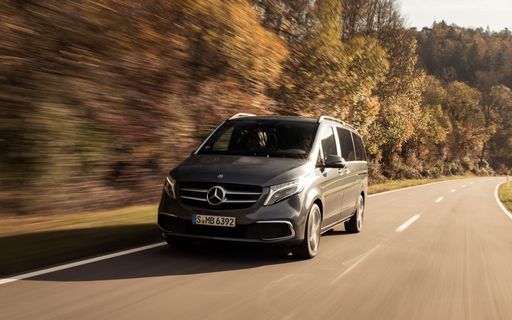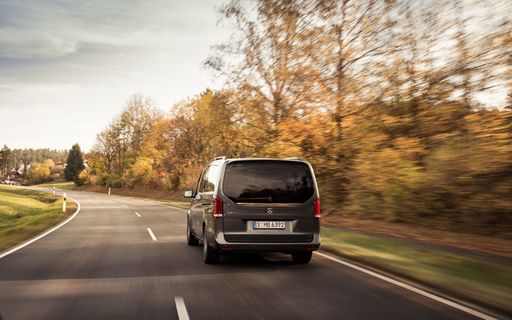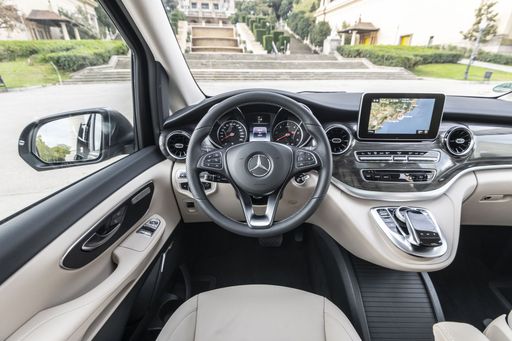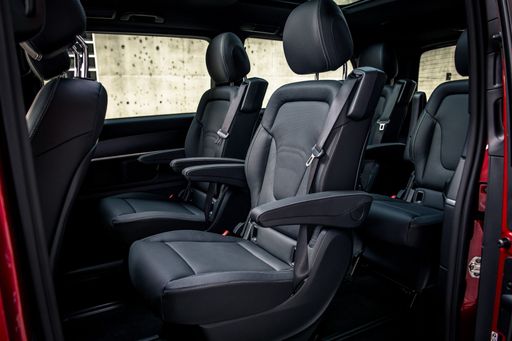Mercedes V Class vs Toyota Proace Bus - Differences and prices compared
Compare performance (237 HP vs 180 HP), boot space and price (48200 £ vs 31600 £ ) at a glance. Find out which car is the better choice for you – Mercedes V Class or Toyota Proace Bus?
Costs and Efficiency:
Price and efficiency are key factors when choosing a car – and this is often where the real differences emerge.
Toyota Proace Bus has a decisively advantage in terms of price – it starts at 31600 £ , while the Mercedes V Class costs 48200 £ . That’s a price difference of around 16600 £.
Fuel consumption also shows a difference: Toyota Proace Bus manages with 6.50 L and is therefore slight more efficient than the Mercedes V Class with 7.10 L. The difference is about 0.60 L per 100 km.
Engine and Performance:
Under the bonnet, it becomes clear which model is tuned for sportiness and which one takes the lead when you hit the accelerator.
When it comes to engine power, the Mercedes V Class has a evident edge – offering 237 HP compared to 180 HP. That’s roughly 57 HP more horsepower.
In acceleration from 0 to 100 km/h, the Mercedes V Class is convincingly quicker – completing the sprint in 7.40 s, while the Toyota Proace Bus takes 13.30 s. That’s about 5.90 s faster.
In terms of top speed, the Mercedes V Class performs noticeable better – reaching 220 km/h, while the Toyota Proace Bus tops out at 170 km/h. The difference is around 50 km/h.
There’s also a difference in torque: Mercedes V Class pulls to a small extent stronger with 500 Nm compared to 400 Nm. That’s about 100 Nm difference.
Space and Everyday Use:
Beyond pure performance, interior space and usability matter most in daily life. This is where you see which car is more practical and versatile.
Seats: Toyota Proace Bus offers clearly perceptible more seating capacity – 9 vs 6.
In curb weight, Toyota Proace Bus is to a small extent lighter – 1835 kg compared to 2192 kg. The difference is around 357 kg.
In terms of boot space, the Mercedes V Class offers decisively more room – 1410 L compared to 0 L. That’s a difference of about 1410 L.
When it comes to payload, Toyota Proace Bus noticeable takes the win – 1265 kg compared to 908 kg. That’s a difference of about 357 kg.
Who wins the race in the data check?
The Mercedes V Class holds a narrow overall lead in the objective data comparison.
This result only shows which model scores more points on paper – not which of the two cars feels right for you.
Costs and Consumption
View detailed analysis
Engine and Performance
View detailed analysis
Dimensions and Body
View detailed analysis

Mercedes V Class
Mercedes V Class
The V‑Class is the grown-up people mover that blends executive-level comfort with van practicality, ideal for those who want to ferry family and gear without sacrificing luxury. Inside it's plush and flexible, with clever touches that turn long hauls into a comfortable commute and still manage to look serious on the school run.
details



Toyota Proace Bus
The Toyota Proace Bus is a pragmatic people‑mover that swallows passengers and luggage with the kind of everyday practicality fleet managers and large families will appreciate. It may not thrill the enthusiast, but its sensible layout, sturdy build and Toyota badge make it a dependable, no-nonsense choice for anyone needing space and reliability rather than flash.
detailsCosts and Consumption |
|
|---|---|
|
Price
48200 - 83300 £
|
Price
31600 - 57100 £
|
|
Consumption L/100km
7.1 - 10.2 L
|
Consumption L/100km
6.5 - 6.7 L
|
|
Consumption kWh/100km
-
|
Consumption kWh/100km
24.2 - 24.3 kWh
|
|
Electric Range
-
|
Electric Range
218 - 343 km
|
|
Battery Capacity
-
|
Battery Capacity
-
|
|
co2
187 - 232 g/km
|
co2
0 - 177 g/km
|
|
Fuel tank capacity
57 - 70 L
|
Fuel tank capacity
69 L
|
Dimensions and Body |
|
|---|---|
|
Body Type
Bus
|
Body Type
Bus
|
|
Seats
6
|
Seats
5 - 9
|
|
Doors
5
|
Doors
4 - 5
|
|
Curb weight
2192 - 2464 kg
|
Curb weight
1835 - 2140 kg
|
|
Trunk capacity
610 - 1410 L
|
Trunk capacity
0 L
|
|
Length
4895 - 5370 mm
|
Length
4983 - 5333 mm
|
|
Width
1928 mm
|
Width
1920 mm
|
|
Height
1901 - 1908 mm
|
Height
1890 mm
|
|
Max trunk capacity
4200 - 5010 L
|
Max trunk capacity
-
|
|
Payload
636 - 908 kg
|
Payload
825 - 1265 kg
|
Engine and Performance |
|
|---|---|
|
Engine Type
Diesel, Petrol
|
Engine Type
Electric, Diesel
|
|
Transmission
Automatic
|
Transmission
Automatic, Manuel
|
|
Transmission Detail
Automatic Gearbox
|
Transmission Detail
Reduction Gearbox, Manual Gearbox, Automatic Gearbox
|
|
Drive Type
Rear-Wheel Drive, All-Wheel Drive
|
Drive Type
Front-Wheel Drive
|
|
Power HP
163 - 237 HP
|
Power HP
136 - 180 HP
|
|
Acceleration 0-100km/h
7.4 - 10.7 s
|
Acceleration 0-100km/h
13.30 s
|
|
Max Speed
188 - 220 km/h
|
Max Speed
130 - 170 km/h
|
|
Torque
370 - 500 Nm
|
Torque
260 - 400 Nm
|
|
Number of Cylinders
4
|
Number of Cylinders
4
|
|
Power kW
120 - 174 kW
|
Power kW
100 - 132 kW
|
|
Engine capacity
1950 - 1999 cm3
|
Engine capacity
2184 cm3
|
General |
|
|---|---|
|
Model Year
2025
|
Model Year
2024 - 2025
|
|
CO2 Efficiency Class
G
|
CO2 Efficiency Class
A, F, G
|
|
Brand
Mercedes-Benz
|
Brand
Toyota
|
Is the Mercedes V Class offered with different drivetrains?
Available configurations include Rear-Wheel Drive or All-Wheel Drive.
